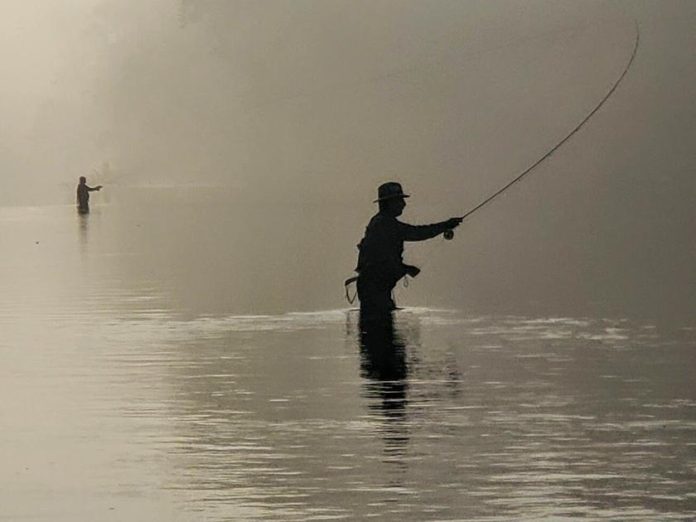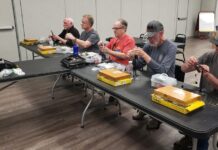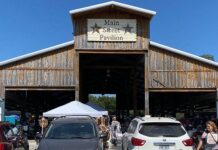The way that I look at it, there are four kinds of fishing: big, bass, bucket and best.
I have done them all and will explain the best.
Big fishing. This is the type of fishing done from a large boat, either on the ocean or on a very large lake, like one of the Great Lakes.
I have done deep-sea fishing and caught 60 pounds of grouper, other saltwater fish, and plenty of great-eating Lake Erie perch.
But I have to admit that 90 miles from shore out on the ocean, or on a bobbing sailboat on Lake Erie, I spend as much time feeling green and leaning over the rail, as I do fishing, if you know what I mean.
“Big fishing” is not for me.
Bass fishing. Bass fishing is best done from a bass boat. I don’t get seasick on a bass boat, but I don’t have one and don’t love bass fishing enough to buy one.
I have caught plenty of smallmouth bass on the Susquehanna River in Pennsylvania, and on Daddy’s Creek and the Obed River here in Tennessee.
I have caught largemouth bass from farm ponds in Texas, the lakes in Fairfield Glade and in Meadow Park Lake in Crossville.
But bass fishing is not my favorite.
Bucket fishing. Bucket fishing and lawn-chair fishing are the same thing. You sit on an upturned 5-gallon bucket or a cheap lawn chair with a container of worms, crickets or salmon eggs at your right side, and a cooler of beer at your left side.
By my observation, many bucket fishermen often keep all the fish they catch, regardless of limits or regulations, and abandon their empty worm containers next to the water when they leave.
I said many, not all.
Obviously, I am not a fan of bucket fishing.
Best fishing. For me, the best type of fishing is fly fishing, and the best kind of fly fishing is fly fishing for trout. Let me explain.
Fly fishing for trout is usually done on cold mountain streams because that is where trout live.
Cold mountain trout streams are usually in beautiful surroundings, shaded from hot summer sun, and protected from winter winds.
When you are in your waders in a beautiful cool stream you are both physically and mentally immersed in your environment. Everything is slower, more relaxed, and stress free.
Some states have a season for trout fishing, but not here in Tennessee. We can — and do — fish all winter long.
You don’t see too many big, bass or bucket people fishing on a winter day. There will be plenty of nice days in the next four or five months to get out and enjoy fly fishing. I have even caught trout with the snow falling down and the line freezing to the rod. I was warm in my waders, ski hat, Polartec and fingerless gloves. Those kind of days make me smile.
The majority of fly fishers practice catch and release. And, by using artificial lures, fish never swallow the bait, so every trout is caught in the mouth where you can easily remove the hook without harming the fish.
With catch and release, you and the fish can meet next week and do it all over again. It is a win-win for both the fish and the fisherman.
Many trout fishermen and women tie their own flies, which is an enjoyable hobby all its own. Instead of paying $3 to buy a fly, you can tie your own for 10 cents each.
Of course, in order to tie a fly for 10 cents, you first had to buy $500 worth of feathers, fur, thread, hooks, books, and a flying vice and table. But the thrill of catching a trout on a fly that you tied yourself is worth the cost.
A few of us have even started building our own trout nets out of exotic wood. I now have eight beautiful nets that I built myself, even though I still usually just take my favorite.
If you want to get into the “best” kind of fishing, here is my advice. First, and most important, take a class. There are fly shops in Townsend, Sevierville, Gatlinburg, Knoxville and Nashville that have regular classes. Plus, local guide Susan Thrasher teaches a class at her facility on the Caney Fork River.
Then, next step, go out with a professional fly fishing guide. Three great choices are David Knapp at Troutzoneanglers.com, Susan Thrasher at Southernbrookies.com or David Perry at Southeasternfly.com. A class plus a guide trip will shorten your learning curve exponentially.
Take your choice: big, bass, bucket, or best. I’ll take the best.
Comments, questions or suggestions for future nature articles are welcome at don.hazel@gmail.com
Credit: Source link






























